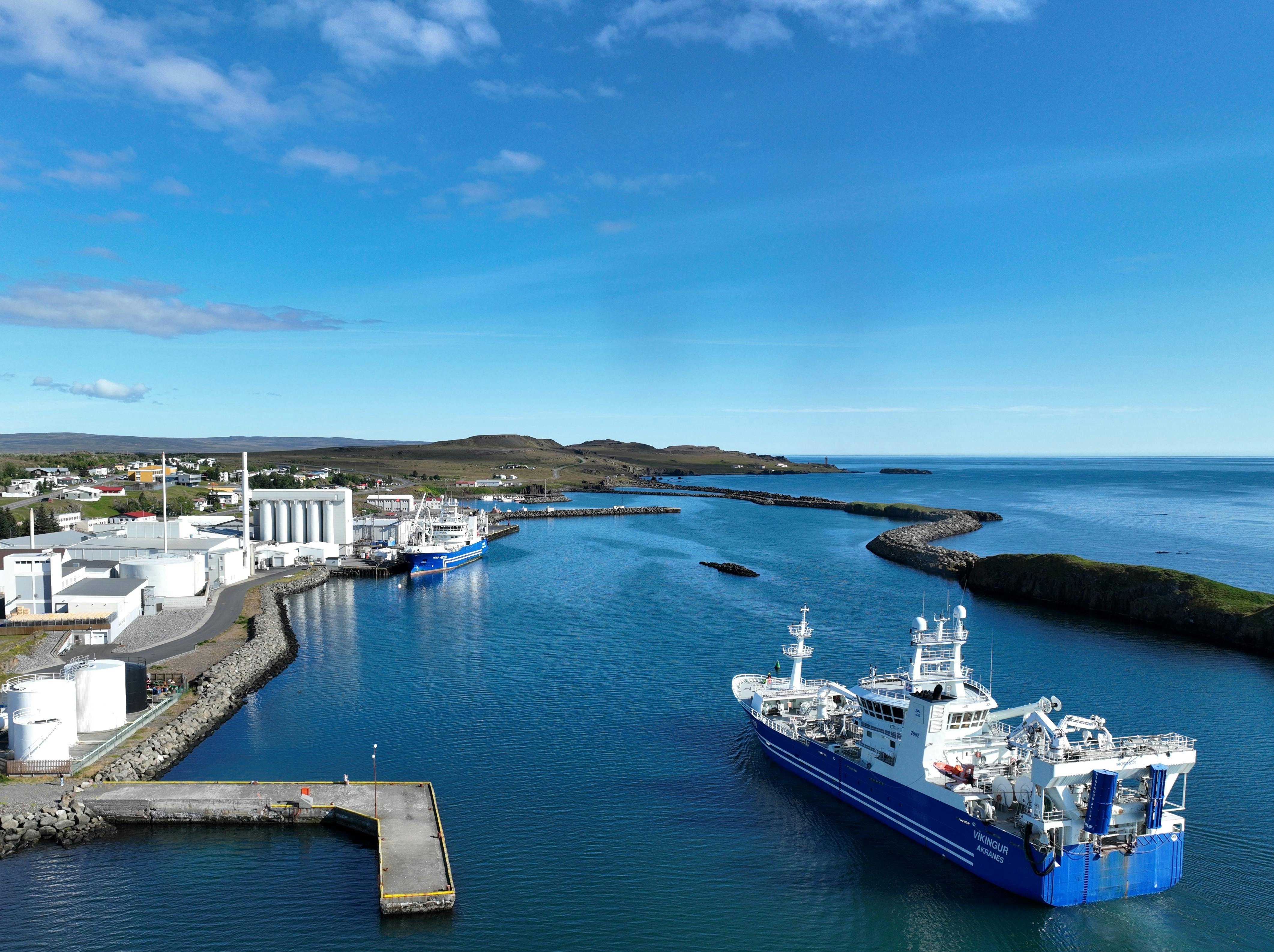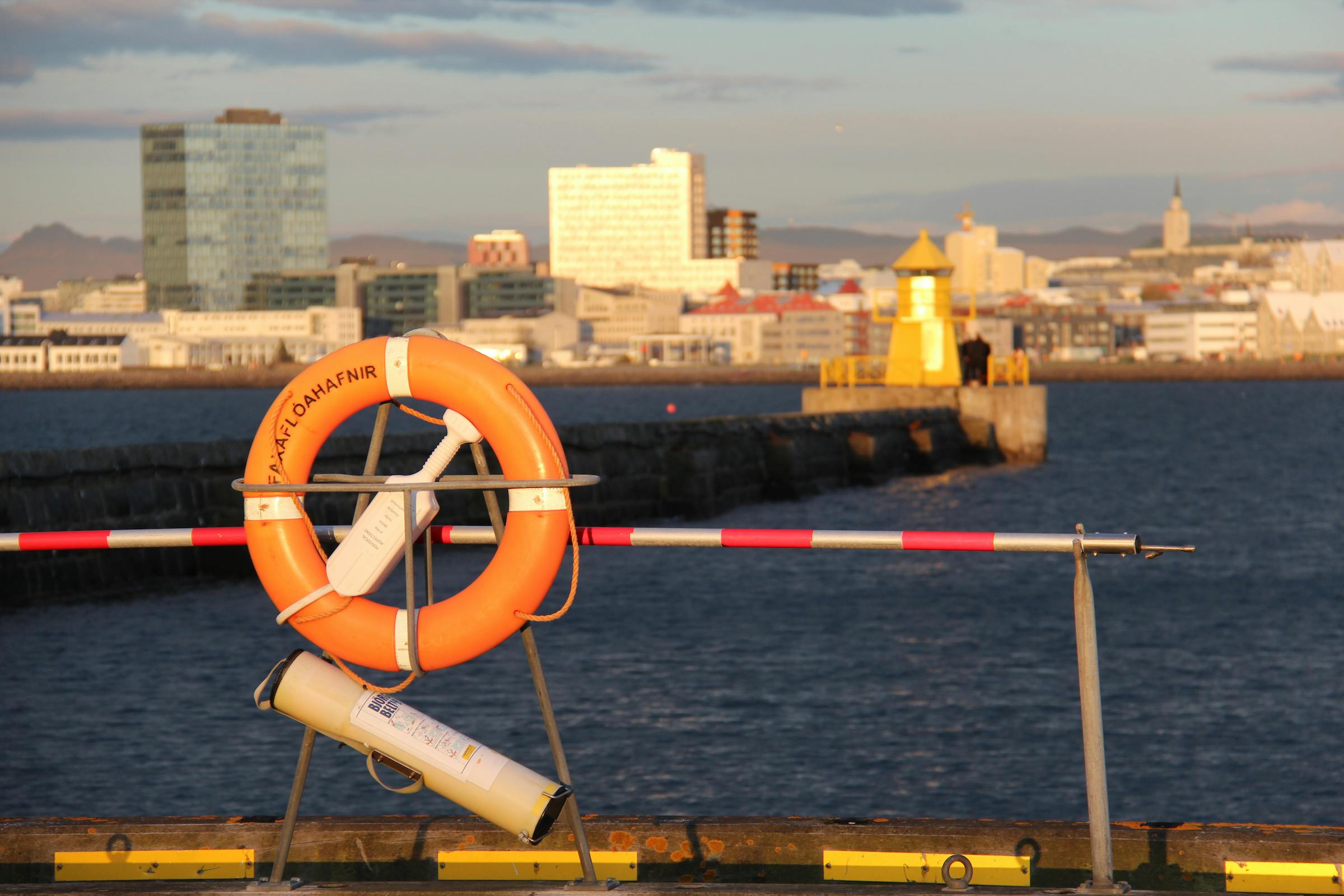Brim hf.
Annual and Sustainability Report 2023

Our role is to boost value creation in the fisheries sector in harmony with society and the environment, and to generate value and profits for staff, customers, shareholders and society as a whole. We place great importance on taking proper care of natural resources and utilising them in a sustainable way. Brim is one link of many in the chain of preserving and utilising resources to create value for society, and we pass on our resources to future generations in good condition.

CEO’s Address
Brim’s results were solid in 2023. We strive towards streamlined and sustainable operations, targeted use of catch quotas, growth, greater profitability, and dynamic marketing and sales.
Catch quotas increased for some fish species, but fell or even disappeared completely for others, e.g. deep-water redfish. Bottom-trawling operations were fairly successful but yielded a lower margin than in the previous two years, mainly due to market conditions where there was pressure on product prices and higher costs in fishing and processing in Iceland.
Fishing and processing of pelagic fish went well over the past year, as did sales of pelagic products. The markets for meal and fish-oil products were strong and product prices were good. We were successful in selling capelin roe and mackerel products – there was high demand for herring products and prices were good. Sales of capelin roe were slow, and prices fell significantly.
We at Brim have become accustomed to varying conditions in our foreign markets. Some places are experiencing war and unsteady regimes, and inflation is raging in many places – all of which affects our customers in many ways. In order to cope with these challenging market conditions, we have focused on strengthening our marketing and sales system in recent years. An important milestone was reached last year, when we completed our purchase of a half share in the Danish company Polar Seafood Denmark, which is a sales company, as well as a processor and exporter of seafood. In the autumn, we also acquired a 10.83% share in Iceland Seafood International, a sales company listed in Nasdaq Iceland.
2023 demonstrated the strength inherent in diversified operations – results for the pelagic sector were good, whereas the demersal fish sector was more problematic. Results were therefore impressive as a whole – income was ISK 65.2 billion, and profit totalled ISK 9.4 billion (14.4% of the operating income for the year). Performance was therefore positive compared to previous years. Brim’s finances are as solid as ever – total assets are around ISK 143 billion and equity ISK 71.1 billion, roughly half of the total assets. Our financial position is good – in the course of the year, we signed an agreement with the international food and agricultural bank Rabobank, the Nordic Nordea bank and Norway’s DNB Bank for a ISK 33 billion syndicated loan, on terms that bear witness to the confidence of international markets in our sustainable fishing and processing of high-quality seafood.
When things go well for us at Brim, it is always thanks to the team as a whole – everybody has the relevant know-how for their area of work, everybody gives their all, and everyone is pulling in the same direction. This was the story of 2023. Our staff – whether in fishing and processing or in marketing and sales in Iceland or abroad – showed once again what they are made of.
The way forward in environmental matters
Our role is to boost value creation in the fisheries sector in harmony with society and the environment, and to generate value and profits for staff, customers, shareholders and society as a whole. We place great importance on taking proper care of natural resources and utilising them in a sustainable way. Brim is one link of many in the chain of preserving and utilising resources to create value for society, and we pass on our resources to future generations in good condition.
Environmental awareness is one of the fundamental aspects of our activities. We are therefore committed to gaining knowledge of the environment and marine life so we can play a decisive role in shaping the debate and creating a framework for environment issues, which are becoming ever more large-scale and costly for companies, individuals and society as a whole. We are at a crossroads and need to opt for successful ways forward in environmental matters. In Iceland, we are facing significant costs linked to these issues in the coming years. It is important for us to protect our valuable resources.
We must be wary of the idea of imposing environmental charges on the fishing industry for factors that it has limited ability to influence. The Icelandic government has set the objective of zero fossil-fuel use in coastal fishing by 2050. It is an admirable objective, but the way to do it is not a separate tax on the use of fossil fuels in the meantime in the hope that taxation will speed up the process. The Icelandic fishing industry has burned fuel to power the engines of fishing vessels and boats for over a century and will continue to do so until the world’s leading engine and ship manufacturers offer ships with engines powered by ecological energy sources. In recent decades, the Icelandic fishing industry has shown that it is a world leader in the sustainability of fishing and processing, and in recent years it has systematically reduced the environmental impact of fishing. This can be seen in the case of Brim, which has reduced greenhouse gas emissions by 30% since 2015, based on the value of seafood products sold. It is safe to assume that the Icelandic fishing industry will react quickly when fishing vessels powered by green energy sources arrive on the market. It would be a strange move by the government to raise taxes on companies in the sector in the meantime for using the only option currently available. This would weaken companies’ financial ability to respond quickly and make the necessary investment when new technologies become available.
Today, Brim struggles with not being able to get the electricity it needs for its activities at Vopnafjörður. It is wrong in a country of abundant energy that electricity should be in short supply and heavily taxed, leading to a slow-down in investment that speed up energy transition. Nobody doubts the importance of sustainability, the diversity of species or efforts to lower carbon dioxide emissions, but it is important that the methods offered by the powers that be are used prudently and sensibly. Wasting value to pursue objectives that nobody disputes is also a waste.
Our key metrics in environmental matters are constantly developing in line with greater know-how within the company and in society as a whole. We are working on various projects related to our environmental goals – such as improving the use of energy and waste heat in fishmeal production, the electrification of ships at ports, the electric-powered transport of seafood products on land, developing ecological fishing gear, and creating a management system and software to manage non-financial aspects and metrics. Many of these projects are run in cooperation with innovative companies, universities and research institutions.
The whims of man and nature
The forces of nature have always left their mark on the fishing industry – and 2023 was no exception. The weather and fish catches varied according to species and the seasons. Over the years, the fishing industry has adapted to the whims of nature and has become better at responding to uncertainty and weather changes. It has proven more difficult to deal with the whims of people, especially politicians. Those who should be protecting us are instead striking a blow. Instead of helping the fishing industry by reducing uncertainty, creating stability and increasing predictability, the government has significantly increased upheaval, unrest and uncertainty with unexpected and even illegal administrative measures, and the unauthorised announcement of changes that completely change the conditions and basis for the operations of companies in the sector. On top of that, in 2023 the government was sanctioned for using independent institutions for political purposes without any legal basis for doing so.
First, during the year the government shut down one fishing company with 24 hours’ notice. Then, it kept the entire industry in the grip of uncertainty with news that officials at the Ministry of Food were drafting new fisheries management legislation with no input from those who have worked under the existing legislation for decades or from those who had worked on the Auðlindin okkar [Our Resources] project. This came as a surprise, since the current coalition government agreement states that the financial benefits of the system are to be assessed and a comparison made of the situation in Iceland and abroad, before proposals are made to maximise Iceland’s potential for further achievement. No assessment or comparison had been carried out when the minister unveiled a new bill which will transform many aspects of the sector. There is still no comparison conducted today. It makes things very difficult for fishing companies in costly operations to have to deal with the whimsical decisions of the government, which – to make matters worse – says one thing and does another. Trust in the government is failing, and with it the belief that the framework of the industry can hold. This framework lays the foundation for all major company decisions on investment and future development. The lack of trust that the government’s actions are creating leads to less investment, stagnation and worse living standards for the nation.
And misfortunes seldom come alone. Mistrust of the fishing industry towards the administration in the sector is also growing. The government’s decisions on catch limits for various species are ever more surprising, and the scientific basis of some of them is both meagre and ambiguous, and does not correspond with the information and experience of ship captains and fishermen who are fishing all year round. In addition, decisions such as banning all fishing for deep-water redfish for obscure reasons make things difficult for fisheries, as fish do not swim around the seas according to the rules of the Icelandic administration. Deep-water redfish are often caught as by-catch when fishing for other species, and therefore such a ban also has a knock-on effect of that type of fishing. The administration could work more closely with the fishing industry, share information and have a lively exchange of views.
The government’s decisions in recent years on fishing for capelin have also raised question marks about long-term perspective, when a fishing ban is recommended one year and 900,000 tonnes of catch the next. Such advice does not encourage prudence or stability, and it is hard to believe that it actually contributes to sustainable utilisation of the resource. I have felt growing mistrust among those working in the fishing industry regarding the assumptions which underpin government advice and which form the basis for decisions on fishing permits. This is extremely unfortunate.
The administration needs to make greater efforts to avoid treating those of us who work in the industry with arrogance and suspicion, as we simply want consultation, cooperation and guidance. We all have the same goal – to engage in sustainable fishing and create value for society as a whole.
They say things come in threes. In 2023, we once again had dealings with the Icelandic Competition Authority (ICA) who, in July, decided to fine us ISK 3.5 million per day until it received a satisfactory reply to its request for information on property relations. We believed that the ICA’s request was had no authority in law and challenged the decision with Competition Appeals Committee. Our view was that the ICA was using its investigative powers in policy-making at the Ministry of Food, rather than to monitor competition. The Appeals Committee concluded that the contractor agreement that the ICA had entered into with the Ministry to investigate management and ownership relationships in the fishing industry – and for which it was to be paid – was not in line with the ICA’s role, and that the ICA was therefore not authorised to use its powers and coercive measures (such as daily fines) against Brim to demand said information. In short, the Appeals Committee agreed with Brim. In this case, the government was exposed for abusing public authority and thereby eroding trust in institutions that play an important role in society, such as promoting strong competition in the interest of the general public.
It can be seen how the government's actions over the past year have contributed to growing mistrust of the industry towards the government. The government seems to be pulling in a different direction to the industry and, looking back, it seems to me that they have been doing so for years. Almost every action taken by the government – whether changes to laws or regulations – has increased the burden on companies, weighed them down and limited their potential for growth and optimisation. At the same time, our huge competitors are thriving on international markets like never before and have now, amongst other things, established themselves in Icelandic salmon production.
When I meet representatives of these large companies – ten times larger than Brim – and they tell me about their plans for even further growth and optimisation, I am struck by the thought that Icelandic fishing companies have fewer and fewer opportunities. Iceland’s major fishing companies are locked into quotas and are confined by multiple uncertainties created by the competition authorities by interfering with minor streamlining measures and issuing ever-changing definitions of markets and competition.
We have a job to do in this sector. We need to make the public and the government aware of the need for large and powerful companies in the fishing industry in order to maintain the position we have succeeded in building on international markets. We need large companies to ensure access to the most valuable global fish markets, as that is where the value that we bring home to maintain and promote prosperity and well-being in Iceland is to be found. But we also need small and medium-sized fishing companies that are forces in smaller sections of society.
In my opinion, we must highlight the situation that fishing companies now find themselves in, as more and more of them are now listed on the stock market and their direct and indirect owners number tens of thousands. It is important for those investing in fishing companies to be aware of the heavy limitations placed on our growth and optimisation and of the changes that need to be made for fishing companies to enjoy an equal playing field not only with competitors in the seafood market but also with other listed companies on the Icelandic market competing for investors’ funds.
All types of resource utilisation require long-term thinking and investment that pays off over decades. Stability creates the conditions for greater profitability. What Brim wants is a policy-oriented government – no more whims. The fishing industry needs clear rules and predictability. This is in the best interest of everybody who lives in Iceland.
Building trust
Brim wants to be an active player in society. We demonstrate this in a variety of ways - through cooperation and support with numerous partners in the fields of culture, sports and education. We also get involved in a variety of progress-related issues in the immediate environment of our departments and staff. We have also committed to taking part in the public debate on the issues of the fishing industry and society as a whole.
In 2023, I received Þjóðmál magazine’s Community Award for being an advocate of transparency, promoting informative debate and leading Brim in social support. Such recognitions encourage us to keep taking part in the conversation taking place in society about where to go and which ways are the right ones in any given scenario. I am convinced that we can always find the answer by asking ourselves what is best for Icelandic society, our business life and culture and the well-being of the people. Brim and our staff will take part in the discussion, and we will not be afraid to speak our mind. Only through transparency, sincerity and honesty can we foster the trust that is the foundation of a healthy and successful society.

About the Annual and Sustainability Report
For the seventh year in a row, Brim reports on the non-financial aspects of its operations and for the forth time with a joint Annual and Sustainability Report.
All information in the report is in accordance with the best knowledge we have at the time of writing, but it is not an exhaustive assessment of all the impact that Brim has on the environment, society and/or the economy. The report is not audited by a third party, but EFLA has reviewed the presentation and information on environmental aspects.
Information on the non-financial aspects of the operation is prepared in accordance with the GTI Standard (Global Reporting Initiative GRI100-400) and Nasdaq’s UFS guidelines.
Increased requirements for disclosure due to non-financial factors are foreseeable, related to the implementation of CSRD (Corporate Sustainability Reporting Directive) and SFDR (Sustainable Finance Disclosure Regulation). Work on the annual and sustainability report has aimed to prepare Brim's increased disclosure in this area.